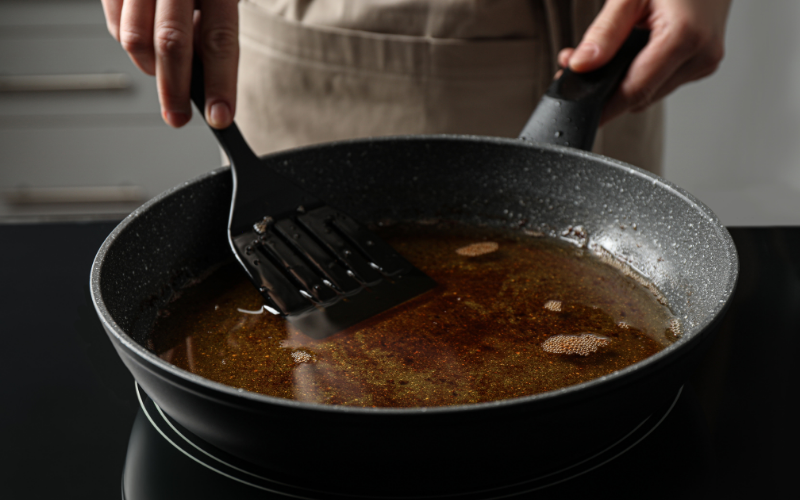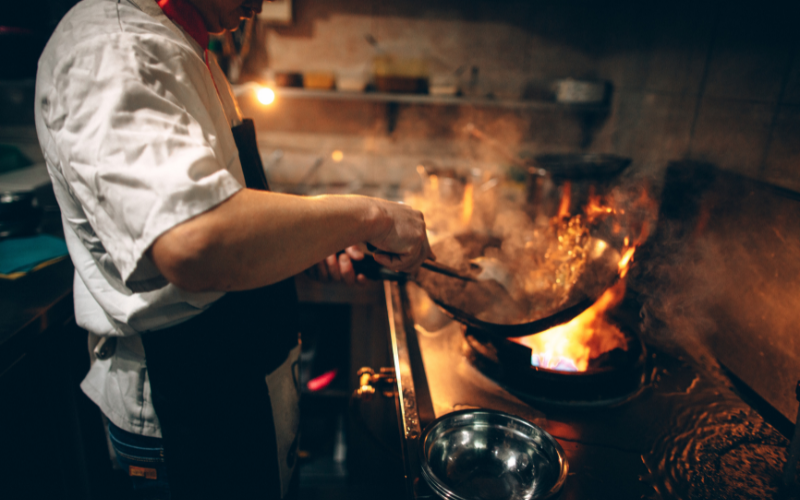Cooking oil is an essential ingredient in all commercial kitchens, including corner cafés and large restaurants. Every foodservice establishment that works with cooking oil must ensure that their staff is properly trained and equipped to handle the cooking oil before, during, and after use. If cooking oil is not handled properly, there is a higher risk of burns and spills that can result in injuries. You must also ensure that used cooking oil (UCO) is put in the proper storage containers because washing it down the drain can cause harm to the sewer system as well as the natural environment. If you do not follow proper protocol for the handling and storage of cooking oil, your business may be subject to fines.
Effective cooking oil management not only ensures a safer and more efficient kitchen but also helps protect the natural environment. The best way to manage cooking oil in your commercial kitchen is to have a restaurant oil management system in place and work with a cooking oil professional such as Mahoney Environmental who provides fresh cooking oil delivery, installation and maintenance for cooking oil equipment, and UCO pickup and recycling.
In this guide, we will discuss tips that will help you manage your cooking oil more effectively which will improve the safety and efficiency of your kitchen and help you protect the natural environment.
Fresh Cooking Oil Delivery
Restaurants that consistently use cooking oil to prepare food should make sure they never run out of fresh cooking oil. Establishing a regular delivery schedule for fresh cooking oil is an important part of cooking oil management.
You can have your fresh cooking oil delivered in jugs within a box (jug in a box) or in bulk. Bulk deliveries are the cleanest and most efficient option as the oil is delivered straight into the storage tank in your oil management system that feeds your fryers. At Mahoney Environmental, we provide fresh cooking oil delivery services that include regularly scheduled and automated deliveries to ensure that you always have fresh cooking oil.
Cooking Oil Storage
The most efficient way to store fresh cooking oil is to keep it in bulk tanks, especially if the tanks are connected to your oil management system and can automatically feed fresh oil into your fryers. If you get fresh cooking oil delivered in jugs in boxes, you need to keep them stored indoors in a cool, dry place that is out of the way and off the floor in case the oil pools. Pooled oil creates a slip hazard and attracts insects and rodents.
Filling the Fryers
Automated systems make this step easy as you simply need to flip a switch or turn a lever to fill the fryers. If your system requires your staff to pour the oil in the fryers manually, make sure they are trained to slowly pour the oil to prevent it from splashing on the floor. Even small amounts of splashback can cause the floor to become dangerously slippery which can lead to injuries.
Adding Shortening
If you add solid shortening to the cooking oil, you should either melt it before adding it to the fryers or cut it into small pieces. Place the shortening below, between, and on top of the tubes without leaving any air spaces. Then turn on the burners for 5-10 seconds and turn them off for a minute, repeating this cycle until the shortening has melted. If you see smoke when the burners are on, this means that the shortening is burning. When this happens, turn the burners on for a shorter amount of time and turn them off for longer when melting them. Burnt oil has a shorter lifespan.

Filtering the Cooking Oil
The quality of the cooking oil you use will affect the quality of your food. Filtering the cooking oil regularly is a great way to maximize the use of the cooking oil and produce better quality food. Each time you filter the oil, you can extend its useful life by one day. Neglecting to filter the oil can shorten its life by as much as two days.
The oil should be filtered to remove crumbs and other food particles 2-5 times per day. The best times to filter your oil are after the lunch rush and after the dinner rush, guaranteeing at least two filters per day. After 2-5 uses, you should replace the oil with fresh cooking oil.
Oil Filtering Tips
We recommend that you use a Portable Filter Machine (PFM) to filter your oil following these steps:
- Wait until the oil has cooled
- Put the grate with the elevated bars on the floor of the PFM
- Put a fresh piece of filter paper on the top screen and smooth it out
- Put the weight on top of the filter paper
- Push the handles of the weight into the protruding metal pieces on both ends to lock it in
- Put the basket back into the PFM to catch large crumbs
- Attach the hose and filter wand
- Remove the PFM lid and keep it nearby
- Roll the PFM to the fryer and open the fryer door
- Screw the adapter into the exit pipe
- Make sure the spout is facing down in the food basket
- Secure the extension onto the exit pipe
- Open the exit pipe valves so the oil starts to fill the PFM
- Aim the wand into the center of the fryer and turn on the PFM
- Let the oil circulate through the PFM and back into the fryer
- Rinse food particles off the sides of the fryer with the oil
- Run the motor on the PFM for about 6-8 minutes which will allow the oil to circulate through the filter machine several times
Degraded Cooking Oil
Cooking oil naturally degrades as it is used, but there are additional factors that can cause it to degrade faster. It is important to protect the cooking oil from the following to keep the oil pure and extend its usefulness:
- Water: Keep water out of the cooking oil by allowing frozen foods enough time to thaw before putting them in the fryer.
- Heat: Keep the heat below 250 degrees F when not in use or turn off the vats.
- Air: Keep the oil vat covered with a metal lid when not in use or when the kitchen is closed.
- Soap: Fryers should be cleaned with hot water only. If you use soap to clean the deep fryer, make sure you rinse the fryer with a diluted vinegar solution to remove soap residue.
- Salt: Food should never be salted or seasoned in or over the deep fryer. Your kitchen should have a separate station away from the fryer for salting and seasoning.
- Carbon: Charred food crumbs need to be removed from the vats.
You should never use degraded cooking oil because it will negatively affect the flavor, smell, and color of your food. Make sure the cooking oil is changed before it starts to smoke or foam. Degraded cooking oil can also cause adverse health effects as it contains oxidized lipids and acrylamides.
Used Cooking Oil Storage and Recycling
When the cooking oil has passed its useful life, it must be properly stored and picked up for recycling. UCO should never be washed down the drain because it can damage the plumbing and sewer system and pollute the natural environment. Recycling the UCO is the most environmentally friendly option as it can be processed and reused to produce renewable diesel and sustainable aviation fuel (SAF).
Transfer the UCO to the storage containers once it is no longer useful. If you have an automated system, you can transfer the UCO by turning a lever or flipping a switch. If you must transfer the UCO manually, the Portable Filter Machine (PFM) is the safest option as your staff can transfer the UCO without ever making direct contact. Setting up regular UCO pickup services with Mahoney Environmental will ensure that your UCO is picked up and taken for recycling before the containers get full.
Cooking Oil Management Services from Mahoney Environmental
Proper cooking oil management is crucial for maintaining a safe, efficient, and environmentally responsible commercial kitchen. Every step of cooking oil management, from fresh oil delivery and storage to filtering and recycling UCO, plays a vital role in the operation of your restaurant. Implementing a cooking oil management system and partnering with Mahoney Environmental for UCO pickup and recycling can improve efficiency, reduce waste, ensure compliance with safety regulations, and contribute to a more sustainable future.
At Mahoney Environmental, we offer a range of cooking oil management services to help restaurants effectively manage their cooking oil. Our services include the delivery of fresh cooking oil, the design and installation of cooking oil equipment, and used cooking oil pickup and recycling. Our regularly scheduled fresh oil deliveries and UCO pickups will ensure that your restaurant always has fresh cooking oil while never running out of UCO storage space.
Give Mahoney Environmental a call at (800) 892-9392 to learn more about how we can help your establishment with your cooking oil needs.



 Call Us Now (800) 892-9392
Call Us Now (800) 892-9392